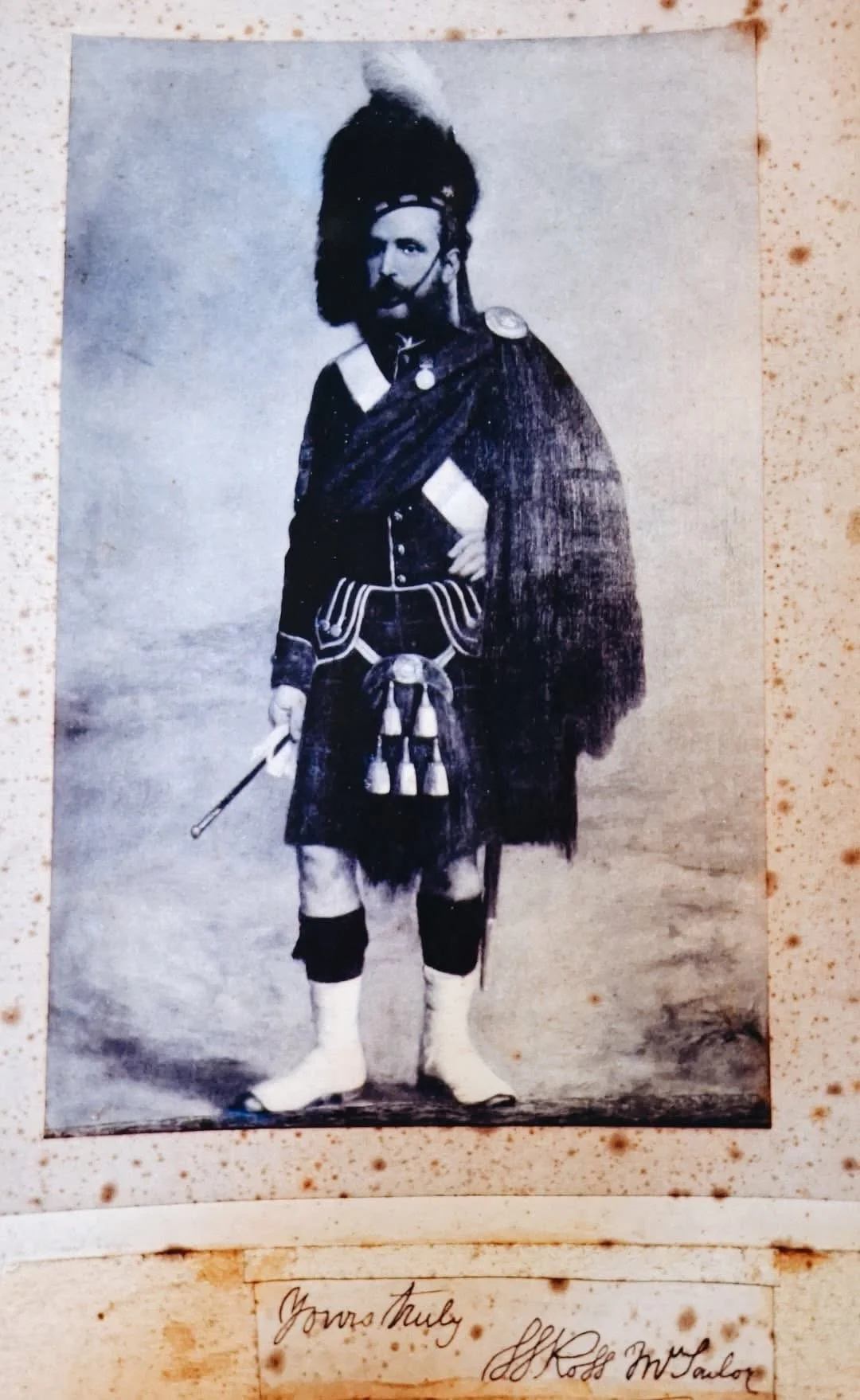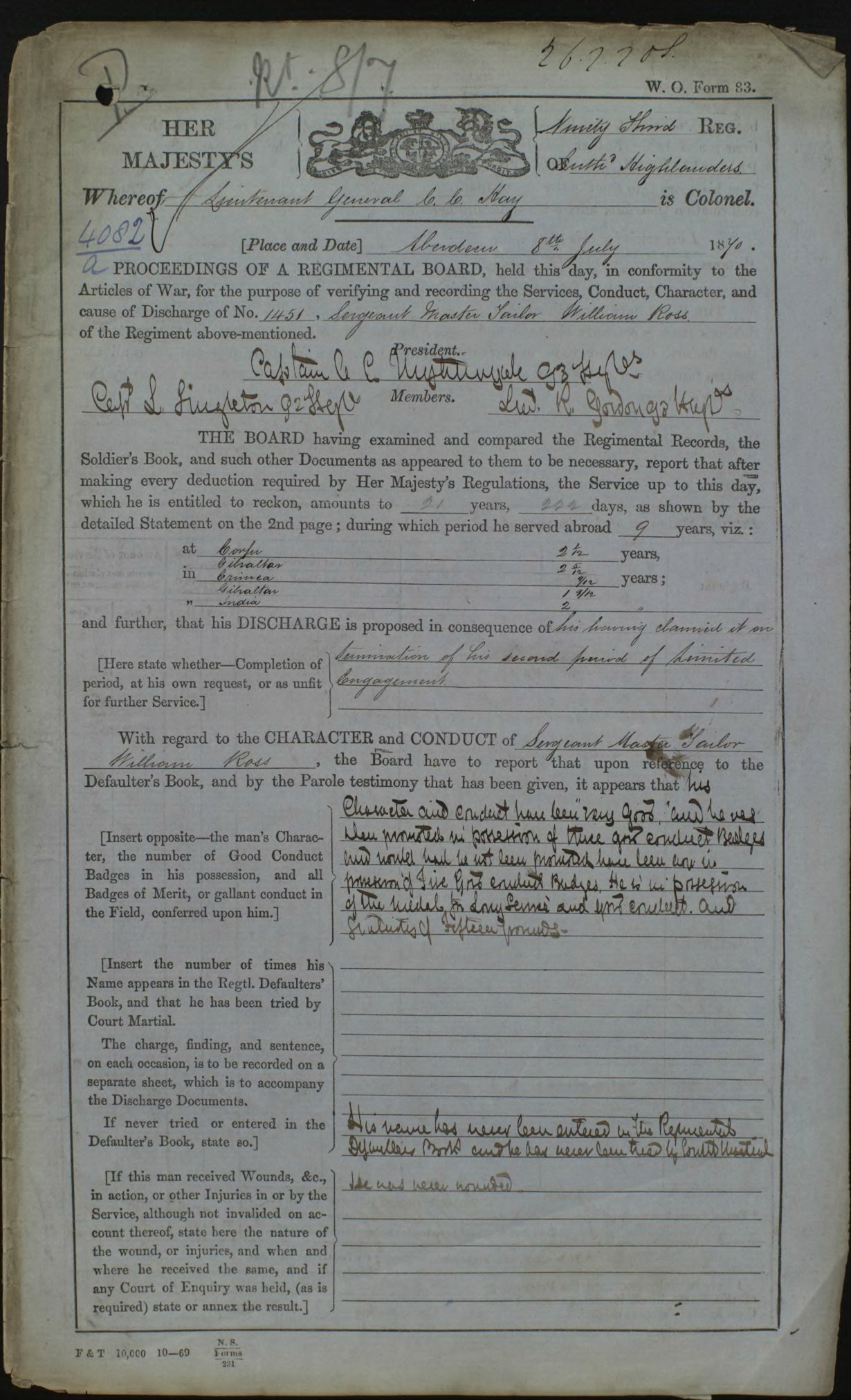While researching my family history, I uncovered something remarkable: three generations of my ancestors - on both sides of my family - served in the Gordon Highlanders, one of Scotland’s most iconic regiments.
From the heat of the West Indies and India, to the frozen fields of France, and even the POW camps of Germany, this regiment runs like a thread through more than a century of our history. What began as a search for names and dates quickly became a story of endurance, skill, and quiet service - one that is deeply woven into the very fabric of my family.
Even my name reflects this legacy. My first name, Ross, comes from my Grandad Edward’s surname, linking me directly to both Andrew and William Ross. My middle name is Andrew. And my surname, Colquhoun, connects me to a third man - my great-grandfather James on the other side of the family. In name alone, I’m connected to all three of the men who served.
Private Andrew Ross – A soldier worn down by empire
Andrew Ross was a Highlander who was born in Nairn and enlisted in the 92nd Highlanders in 1827, aged 18. Over nearly 23 years, he served across the British Empire, stationed in demanding climates that took a visible toll. By the time he was discharged in 1849, his record stated simply that he was “worn out from length of service.”
His overseas service included:
Gibraltar (1 year, 11 months): Perched above the Mediterranean, the fortress of Gibraltar was a constant post for British troops. Life involved routine drills, guard duty in relentless heat, and maintaining readiness in one of the Empire’s most strategic military sites.
Malta (5 years, 2 months): Soldiers were stationed at Floriana or St. George’s Barracks near Valletta. His duties would have included garrison work, guard shifts, and maintaining readiness in a key Mediterranean base. Though not a combat zone, the constant demands of regimental life in a hot, crowded environment added to the strain of long overseas service.
West Indies (Barbados) (2 years, 10 months): Perhaps the most punishing of all. The 92nd were posted to colonies such as Jamaica and Barbados during a time of political unrest and tropical disease. Constant exposure to yellow fever, poor sanitation, and searing heat made survival a challenge.
Andrew’s record included multiple good conduct badges, as well as three court martial proceedings - all resulting in acquittals. That, along with his long service, suggests a man who endured the demands of his post, even as the physical strain added up.
Private Andrew Ross’ military discharge certificate.
William Ross – Master Tailor, master of detail
Andrew’s son, William Ross, was born in Nenagh, Tipperary, likely during his father’s military posting in Ireland. He enlisted in the 92nd Gordon Highlanders in 1860, and over the next 24 years, rose through the ranks to become Sergeant Master Tailor - the regiment’s most senior tailoring authority.
Although his discharge papers mention the 93rd Sutherland Highlanders, William spent almost his entire career in the 92nd, only transferring to the 93rd in the final months before retiring in 1870.
A surviving photograph shows him wearing the distinctive black sporran with five white tassels, a marker of the 92nd - not the six of the 93rd.
His trade skill directly influenced his rapid advancement:
Corporal – 1861
Sergeant – 1862
Sergeant Master Tailor – August 1862
William was the most senior tailor in the regiment who was ultimately responsible for outfitting the regiment, managing uniform production (including hats, jackets and kilts), and maintaining regimental dress standards at home and abroad.
The birth locations of William’s 6 children give chronological clues as to where his service took him and his family in the UK, including; Perth, Stirling, Aldershot, Weedon, Winchester and Aberdeen.
His overseas service included:
Corfu (2 years and 6 months): Part of the British Protectorate of the Ionian Islands, Corfu offered a quieter Mediterranean deployment. It was here that William likely developed or refined his skills, supervising the regiment’s tailoring in a calm but strategically important posting.
Gibraltar (2 years and 5 months): A return to the Rock - this time in a leadership role. William would have overseen a team of tailors and ensured that Highland dress was maintained under challenging conditions.
Crimea (9 months): Serving during or shortly after the Crimean War, William would have faced logistical chaos and harsh winters. His job involved keeping soldiers clothed in unforgiving terrain, repairing uniforms damaged by conflict and exposure.
Gibraltar (1 year and 9 months): A return to the Rock - this time in a leadership role. William would have overseen a team of tailors and ensured that Highland dress was maintained under challenging conditions.
India (2 years): Posted during the tense period following the 1857 Indian Rebellion, William worked in the tropical conditions of northern India, where his role was not only functional but symbolic - maintaining the regiment’s identity through dress in an unfamiliar land.
His conduct record was exemplary: he earned the First Class Conduct Badge, was never entered in the regimental defaulters’ book, and was described as trustworthy and sober - praise that reflected both discipline and the level of responsibility he carried.
Sergeant Master Tailor William Ross’ military discharge certificate.
As I followed the thread of my family’s military history through Andrew and William, I assumed that was the full extent of our connection to the Gordon Highlanders. But what I found next added a new layer to the story - and turned a proud history into something truly remarkable.
On the other side of my family, my Grandad James’ father, James Colquhoun, also served in the Gordon Highlanders, during the First World War. That means both sides of my family - entirely independently - have direct links to the same regiment, in two different centuries.
James Colquhoun - From Mons to Captivity TO FREEDOM
My Grandad James’ father, James Colquhoun, enlisted into the Gordon Highlanders on 28 August 1912, beginning his service at Castlehill Barracks in Aberdeen. He later joined the 1st Battalion, which was posted to Colchester and Plymouth before mobilising with the British Expeditionary Force to France in August 1914.
Within days, he fought at the Battle of Mons, the British Army’s first major clash of the war. He endured the chaotic Retreat from Mons, and at Le Cateau, his unit was outflanked and forced to surrender. On 27 August 1914, James and over 600 comrades were taken prisoner.
James Colquhoun photographed in his uniform as a soldier in the Gordon Highlanders whilst in Colchester (Back row, second from the left).
He spent the next four years as a prisoner of war in Germany, held in camps including Sennelager, Munster III, and Schwelm III. Though conditions were harsh and food shortages worsened near the war’s end, regular mail and Red Cross parcels helped sustain morale. James’s survival through such an extended captivity is testament to his resilience.
According to family stories passed down through the generations, James supposedly escaped from captivity twice before his eventual release. During his imprisonment, he also suffered a severe bout of appendicitis and was forced to undergo a makeshift operation - reportedly performed with a sharpened spoon. He was finally released in November 1918 and formally discharged in September 1919, likely due to health problems caused by his time as a POW.
For his service, he received the 1914 Star & Clasp, British War Medal, Victory Medal, and the Silver War Badge, recognising both his early service and the cost of his captivity.
It’s humbling to think that if James hadn’t been captured, he might have gone on to fight at the Somme or Passchendaele - and like so many others, might not have survived. If events had unfolded even slightly differently, I might not exist at all.
Across both male lines of my family - spanning over 100 years - men who never met served under the same colours, wore the same insignia, and shared the hardships of military life.
The Gordon Highlanders didn’t just shape their time in uniform - they stitched discipline, craft, and endurance into the very fabric of our family’s story.
We will remember them.




